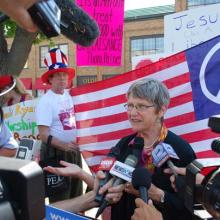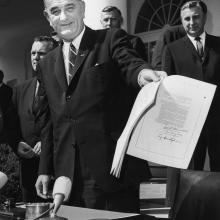war on poverty
This year’s 50th Anniversary of the Poor People’s Campaign provides a critical moment for our nation and people of faith and conscience to pause and conduct a moral scan of our nation’s progress in combatting poverty in America. Despite some progress, poverty in America remains deeply entrenched.
The July report by the Council of Economic Advisers uses an alternate way of measuring poverty, based on households’ consumption of goods, to conclude that poverty has dramatically declined. Though this method may be useful for underpinning an argument for broader work requirements for the poor, the much more favorable picture it paints simply does not reconcile with the observed reality in the U.S. today.
The vituperative attacks on the War on Poverty sound a little gleeful or mean-spirited or nutty—sometimes all three. A quick review of recent press coverage would lead almost anyone to think that Head Start, Legal Services, community health centers, food stamps, ESEA Title I support for education, the Job Corps, and a host of other programs had no connection to the War on Poverty but materialized sui generis to provide vital services to the poor.
The only way to win the “war on poverty” is for liberals and conservatives to make peace — for the sake of the poor. That would be the best way to mark the 50th anniversary of the war on poverty, declared by President Lyndon Johnson in his January 1964 State of the Union address. Making peace means replacing ideologies with solutions that actually solve the problems of poverty. With both Republicans and Democrats speaking out on poverty this week, and the recession slowly receding this should be an opportunity to find the focus, commitment, and strategies that could effectively reduce and ultimately eliminate the shameful facts of poverty in the world’s richest nation.
For any proposal, the basic question must be whether it helps more people and families rise out of poverty and realize their dreams. This means setting aside political self-interest and thinking beyond our too often inflexible ideologies.
HOT SPRINGS, N.C. — The 50th anniversary of President Lyndon Johnson’s launch of the War on Poverty, which falls today, reminds us how intractable that effort can be, despite the hope and determined idealism when the legislation was signed.
Appalachia was one of the targets for the newly established Office of Economic Opportunity, utilizing programs such as Head Start and Volunteers in Service to America (VISTA). The anniversary also recalls how religion has motivated, shaped and sustained this effort, in many ways prefiguring the campaign, in both its successes and failures.
For more than two centuries, these Southern mountains have been a magnet for missionaries, both religious and secular, all determined to wipe out poverty, hunger, and ignorance — whether the region’s benighted folk wanted them to or not. Their too-common failing, local people say, is that the erstwhile do-gooders have not respected the strong beliefs and culture that already existed.
With the best intentions, altruists and uninvited agents of uplift have come with their social gospel of “fixing” local people. That is to wean them from violence and the debilitating use of alcohol, while bringing their brand of faith, along with education, nutrition, and improved living standards. Invariably well-meaning, these efforts have typically ended in disappointment and failure in places such as Madison County, N.C.
Gov. John R. Kasich (R-Ohio) did a shocking thing recently. He broke with his political allies and decided to expand Medicaid to 275,000 poor people in his state through the Affordable Care Act. Then he called a spade a spade, saying: “I’m concerned about the fact there seems to be a war on the poor.”
Kasich’s statement came just two days ago. And today, 47 million low-income Americans will see their food stamps benefits decrease as stimulus funding ends. In light of this newly named “war on the poor,” I’ve been reflecting on Jesus’ story of the Good Samaritan, and the man’s question to Jesus, “Who is my neighbor?” What an intriguing question.
Of course one of the most incredible things about this story is that Jesus never answers the lawyer’s question. Rather, he tells a story about a man beaten by robbers on a dangerous road. He was stripped naked left lying there, clinging to life. Both a priest and Levite pass him by, but a Samaritan went out of his way, broke his usual routine, used up his own gas (or at least his donkey’s energy) to bring the man to an inn. And he took care of him overnight at the inn, offering the innkeeper what would today be about $330.
And then Jesus flips the script! The lawyer asked who exactly is my neighbor? Who do I have to love? And conversely who can I cross off my need-to-love list?
Jesus doesn’t answer the question. Jesus returns his question with a question: “Who was a neighbor to the man who fell into the hands of robbers?”
Nowadays we hardly have a concept of what it means to be a neighbor anymore.
Sister Simone Campbell, the face of the famous “Nuns on the Bus” tours, and Rep. Paul Ryan, the brains behind the House Republicans’ budget-cutting plans, have for more than a year represented diametrically opposed camps on how to apply Catholic social teaching to American fiscal policy.
At a House Budget Committee hearing on Wednesday, the two Catholics had a chance to square off as the sister testified before Ryan’s committee about hardship in America as the nation nears the 50th anniversary of President Johnson’s 1964 declaration of the “War on Poverty.”
Yet there were few fireworks nor much in the way of theological debate, as Ryan, R-Wis., did not go out of his way to champion the GOP budget plan that bears his name. That plan focuses on cutting social programs that Campbell says are key to supporting struggling Americans and also boosting the economy.
I had a conversation with a young woman I met at a conference recently. The conversation rocked me.
I represented the faith voice on a panel at a major secular conference for philanthropists. The panel focused on the question: “What are we not talking about?”
One of my colleagues focused on the nonprofit sector’s inability to make real just change in our world because they are bound by the interests of donors who are, themselves, part of the 1 percent. Another colleague focused on the glut of nonprofits offering similar services in otherwise abandoned communities. I focused on the need for social movements to bring about a more just world and the role of faith communities in those movements, in particular.
Yesterday afternoon Sargent Shriver, a man of God and dedicated public servant, passed away at the age of 95.







